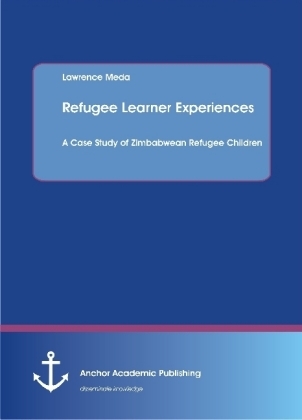
Refugee Learner Experiences. A Case Study of Zimbabwean Refugee Children
Anchor Academic Publishing (Verlag)
978-3-96067-167-1 (ISBN)
The study employed Bronfenbrenner's Social Ecological Model as its overarching theoretical framework. Each stage of the refugee experience was described at each point in time.
Text Sample:
CHAPTER THREE:
Theoretical and Conceptual Frameworks:
3.1 Introduction :
The previous chapter focused on review of literature related to refugee learner experiences. This chapter presents theoretical and conceptual frameworks guiding this study. A conceptual framework can be defined simply as a set of emerging interrelated concepts that are put together to explain a particular phenomenon. There are several different conceptualisations of a theoretical framework. According to Anfara and Mertz (2006) there is no clear and consistent definition of the term theoretical framework. For the purpose of this study, a theoretical framework is conceptualised from a comprehensive definition provided by Kerlinger (1973, p. 73): "A theory is a set of interrelated constructs (concepts), definitions, and propositions that present a systematic view of phenomena by specifying relations among variables, with the purpose of explaining and predicting the phenomena." Both theoretical and conceptual frameworks provide lenses through which research can be conducted and it is essential to have them in an academic piece of writing (Anfara & Mertz, 2006). In this study, conceptual and theoretical frameworks were used as analytical frameworks of refugee learner experiences.
This study adopts Bronfenbrenner's (1979) Social Ecological Model (as ist theoretical framework) which asserts that context and environment play fundamental roles in the development of a child. The model highlights that during the process of human growth and development, a person interacts with microsystems, mesosystems, exosystems, macrosystems and chronosystems. McBrien (2011) postulates that refugee experiences can be looked at from these systems' perspective. Refugee children's experiences are influenced by the context and environment which surrounds them. This chapter begins by discussing the social ecological model where each of the five systems is presented. The chapter also focuses on strengths and some criticisms leveled against the model, and an analytical context for understanding refugee learners' experiences is provided. A conceptual framework for understanding refugee learners' experiences is presented at the end of this chapter. The conceptual framework articulates that refugee learner experiences occur in three fundamental stages, namely: pre-migration, transmigration and post-migration.
3.2 Bronfenbrenner's Social Ecological Model:
Bronfenbrenner (1994) argues that human development can best be understood by considering the entire social ecological context in which growth takes place. Human development is a result of the mutual interaction between persons and the environment (Bronfenbrenner, 1992). A person has to interact with other people in his/her environment and that influences growth and development. Swart and Pettipher (2011) postulated that underlying Bronfenbrenner's theory is the proposition that when there is the interaction of an individual and the environment, development will certainly take place. When there is no interaction among humans in a given environment, children's growth will be compromised.
Kail and Cavanaugh (2010) contend that in the social ecological theory, human development cannot be separated from the environmental context that a person inhabits. Bronfenbrenner's ecological approach proposes that there is a close interconnection between various aspects of human development. The interconnection is very close, just like the threads of a spider's web are intertwined, so that no aspect of development can be isolated from others and understood independently (Kail & Cavanaugh, 2010). Bronfenbrenner (1979, p. 3) argues that "all aspects of development are interconnected like a set of nested structures, each inside the other like a set of Russian dolls". Thus, understanding the growth and development of children requires a close examination of the environment in which they live. Environment influences children's development (
| Erscheinungsdatum | 04.03.2022 |
|---|---|
| Sprache | englisch |
| Maße | 155 x 220 mm |
| Gewicht | 472 g |
| Themenwelt | Sozialwissenschaften ► Soziologie ► Allgemeine Soziologie |
| Schlagworte | Bronfenbrenner • children • Education in South Africa • Johannesburg • Migration • refugee education • Refugee learner • Resilience Education • Social Ecological Model • South Africa |
| ISBN-10 | 3-96067-167-9 / 3960671679 |
| ISBN-13 | 978-3-96067-167-1 / 9783960671671 |
| Zustand | Neuware |
| Haben Sie eine Frage zum Produkt? |
aus dem Bereich


